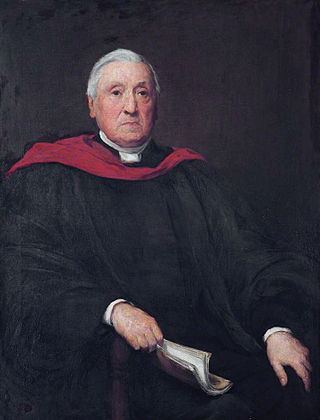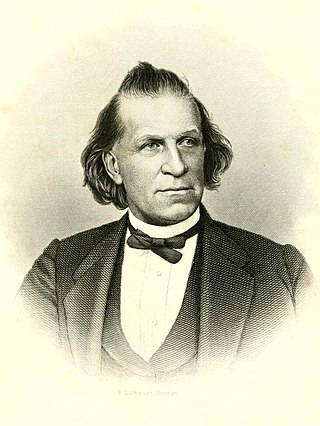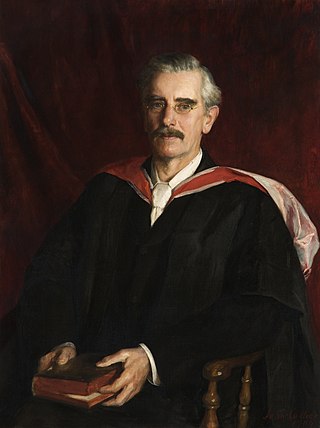
Henry John Roby (20 August 1830 – 2 January 1915), was an English classical scholar and writer on Roman law, and a Liberal Member of Parliament. He was a Cambridge Apostle.

Henry John Roby (20 August 1830 – 2 January 1915), was an English classical scholar and writer on Roman law, and a Liberal Member of Parliament. He was a Cambridge Apostle.
Roby was the son of a solicitor and was born in Tamworth, and was educated at Bridgnorth Grammar School. [1] [2]
He won a scholarship to St John's College, Cambridge in 1849. He graduated as a Bachelor of Arts in 1853, and was the "Senior Classic" or top classics student of that year. He was made a fellow of St John's College in the following year. [1] [3]
He worked as a lecturer and private tutor in Cambridge from 1854 to 1861. He was, however, highly critical of the administration of the university. In particular he felt that the constituent colleges were prone to pursue policies in complete isolation from each other, leading to frequent conflicts. This he likened to the collision of "17 bodies in a confined space moving vagueley in the dark". [1]
In 1860, he left Cambridge, becoming under master of the Upper School at the College of God's Gift, Dulwich. On 13 August 1861, he married Mary Ann Mathilda Ermen, the daughter of Peter Albert Ermen, a Dutch-born Manchester cotton spinner. [4] Finding the teaching of Latin at Dulwich in need of reform, he wrote An Elementary Latin Grammar in 1862. [1] [5] He remained at Dulwich until 1865. [2]
Roby was involved in reforming the governance of public and grammar schools. In December 1864 he was appointed secretary of the Schools Inquiry Commission, which examined some 800 institutions. He was the author of much of the final report of the commission, which led to the enactment of the Endowed Schools Act 1869. [1] [2]
The 1869 Act established an Endowed Schools Commission of which Roby was the first secretary, serving in that office until 1872, when he became a commissioner. The commission was dissolved at the end of 1874. [2] From 1866 to 1868, he was professor of jurisprudence at University College London, lecturing on Roman Law. In 1877, he was made life governor and a member of the Council of Owens College, and a governor of Manchester Grammar School. [2]
Between 1871 and 1874 Roby expanded his 1862 publication into a two volume Grammar of the Latin Language, from Plautus to Suetonius , described by Encyclopædia Britannica as "a storehouse of illustrative quotations from Latin literature". [2] In 1884 he published Introduction to Justinian's Digest and Commentary, for which he was awarded the honorary degree of LL.D by the University of Edinburgh. [1] [2] This was followed in 1902 by Roman Private Law in the Time of Cicero and the Antonines. [1] [6]
With the ending of his work as a schools commissioner in 1874, Roby became a partner in his father in law's firm of Ermen and Engels, sewing cotton manufacturers of Patricroft near Manchester. Soon afterwards the firm changed its name to Ermen and Roby. [1]
Roby was an active member of the Liberal Party, serving variously as chairmen of the Manchester Liberal Executive, the Executive for the North-West Manchester Liberal Association and of the Manchester Liberal Union, and as president of the Eccles Liberal Association.[ citation needed ]
In 1890, the incumbent M.P. for the Eccles division of Lancashire died, and Roby was chosen to contest the seat at the ensuing by-election. He won the seat from the Conservatives, holding it at the subsequent general election of 1892. He was a Deputy Chairman of Committees of the House of Commons. [1] [2]
In 1894, Roby retired from business and in the following year from parliament. He spent the last twenty years of his life in at his residence Lancrigg, Grasmere in the Lake District. He died at Lancrigg in 1915, aged 84. [1]
A grammar school is one of several different types of school in the history of education in the United Kingdom and other English-speaking countries, originally a school teaching Latin, but more recently an academically oriented secondary school, differentiated in recent years from less academic secondary modern schools. The main difference is that a grammar school may select pupils based on academic achievement whereas a secondary modern may not.

Benjamin Hall Kennedy was an English scholar and schoolmaster, known for his work in the teaching of the Latin language. He was an active supporter of Newnham College and Girton College as Cambridge University colleges for women.

Edward Middleton Barry RA was an English architect of the 19th century.

George Long was an English classical scholar.

Manchester Cathedral, formally the Cathedral and Collegiate Church of St Mary, St Denys and St George, in Manchester, England, is the mother church of the Anglican Diocese of Manchester, seat of the Bishop of Manchester and the city's parish church. It is on Victoria Street in Manchester city centre and is a grade I listed building.

James Bradstreet Greenough was an American classical scholar.
John Howard Marsden was an English cleric and academic. He was an antiquarian and became in 1851 the first Disney Professor of Archaeology at the University of Cambridge.

The College of God's Gift, often referred to as the Old (Dulwich) College, was a historic charity founded in 1619 by the Elizabethan actor and businessman Edward Alleyn who endowed it with the ancient Manor of Dulwich in south London. In 1857 it was renamed as Alleyn's College of God's Gift. The charity was reorganised in 1882 and again in 1995, when its varied component activities were split up into separate registered charities. The former constituent elements of College of God's Gift, which have been independent charities since 1995, are:

Sir Ernest Barker was an English political scientist who served as Principal of King's College London from 1920 to 1927.

Joseph Allen, DD was a British clergyman. He was the son of William Allen and his wife Nelly Livesey. William Allen was a partner in Manchester's first Bank, Byrom, Allen, Sedgwick and Place but was made bankrupt in 1788 on the failure of the Bank. This was despite inheriting £20,000 from his father, John Allen, of Davyhulme Hall, Eccles. Allen was educated at the Free Grammar School, Manchester and at Trinity College, Cambridge, where he gained a fellowship in 1793. He was ordained deacon in 1799 and priest in 1800.
Events from the 1510s in England.
Bridgnorth Endowed School is a coeducational secondary school with academy status, located in the market town of Bridgnorth in the rural county of Shropshire, England. Founded in 1503, The Endowed School is a state school and is a specialist Technology College. The age range of the school is 11–18 years. It was previously known as the Bridgnorth Grammar School, and the school celebrated the 500th anniversary of its foundation in 2003. Former pupils include Professor Peter Bullock, the inspirational soil scientist who was a member of the Intergovernmental Panel on Climate Change (IPCC).
Courtney Stanhope Kenny was a British jurist, academic and Liberal politician. He sat in the House of Commons from 1885 to 1888, and was later Downing Professor of the Laws of England at Downing College, University of Cambridge. He is buried with his family in the Parish of the Ascension Burial Ground in Cambridge.
Edward Hardcastle was a British businessman and Conservative politician who sat in the House of Commons between 1874 and 1892.
The 1890 Eccles by-election was a parliamentary by-election held for the British House of Commons constituency of Eccles in Lancashire on 22 October 1890.

Elias Nason was a Massachusetts Congregational clergyman, educator, editor and author.
Arthur Tozer Russell (1806–1874) was an English clergyman known as a hymnwriter.

Augustus Samuel Wilkins (1843–1905) was an English classical scholar. He held a professorship of Latin in Manchester for 34 years.